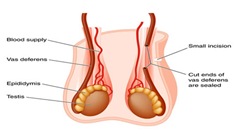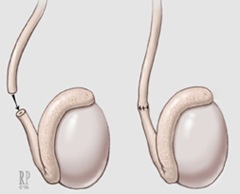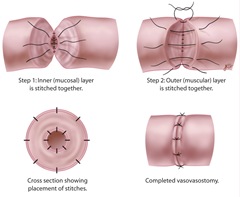What is a vasectomy?
A vasectomy is a simple procedure where the vas deferens is cut to prevent sperm from entering the ejaculate and serves as a method of male sterilization.
What is a vasectomy reversal?
In a typical vasectomy reversal, the two cut ends of the vas deferens are rejoined to once again allow sperm to enter the ejaculate. It is a procedure used to restore male fertility.
Can any vasectomy be reversed?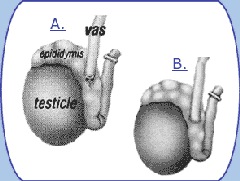
Men are typically cautioned that a vasectomy procedure is permanent. The truth, however, is that most vasectomies can be reversed. Success rates are critically linked to the skill and experience of the surgeon. Macroscopic vasectomy reversals typically have low success rates. Vasectomy reversals performed by skilled and experienced urologists utilizing a high-powered surgical microscope have high success rates.
How do you choose the right surgeon for vasectomy reversal?
Most general urologists perform less than five vasectomy reversals per year. Obviously, their limited experience in this procedure will negatively affect their success rates. It is important to determine if the surgeon you select actually specializes in microscopic vasectomy reversals. Relevant questions to ask include whether the surgeon has had specialty training in microscopic vasectomy reversals and what the extent of his or her experience is in the complicated vasdoepididymostomy procedure. Ask for permission to speak to a few of their patients who have had the reversal performed. Dr. Larish has performed thousands of vasectomy reversals and, for him, even the more complex vasoepididymostomy is routine.
What if my vasectomy was performed 15 years ago?
Evidence does suggest slightly better results with more recent vasectomy procedures, but the success rate with vasectomies performed over 15 years ago is at least 70% with a 30% pregnancy success rate. Dr. Larish has successfully reversed vasectomies performed up to 30 years ago with pregnancies occurring in as little as a few months. Regardless of the length of time since vasectomy, vasectomy reversal remains the most effective and least expensive means of restoring male fertility.
I have already had a vasectomy reversal with no success. Does it make any sense to try again?
Vasectomy reversals typically fail for one of two reasons. At the time of the first surgery, a vasovasostomy may have been performed when, in actuality, a vasoepididymostomy procedure was indicated. The other reason for failure is poor surgical technique in reconnecting the two cut ends of the vas deferens leading to scarring. Success rates following repeat reversals are slightly lower than for first reversals but are not so low that a repeat reversal should be avoided. It remains the procedure of first choice for restoring male fertility. Dr. Larish has performed numerous revisions of failed vasectomy reversals and is justifiably proud of his rate of success.
What is the difference between a vasovasostomy and a vasoepididymostomy?
A vasovasostomy is the standard vasectomy reversal procedure. It consists of simply reconnecting the two cut ends of the vas deferens and restoring sperm flow into the ejaculate. A vasoepididymostomy is where the vas deferens is connected directly to the epididymis on the testicles. This procedure is necessary when a “blockage” is identified in the vas deferens coming from the testicle. This blockage may be due to scarring or inflammation. The blockage prevents sperm from exiting the testicle through the epididymis to the vas deferens and must be bypassed. A vasoepididymostomy is a highly demanding and complex surgical procedure. Only a highly qualified urologic microsurgeon should attempt this procedure. Therein lies the importance of choosing an excellent surgeon.
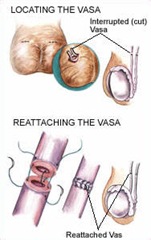 What will the vasectomy reversal surgery be like?
What will the vasectomy reversal surgery be like?
The surgery is performed on an outpatient basis at the Gramercy Surgery Center. You will be at the center anywhere from three to five hours. The surgery itself is performed under general anesthesia. You must be accompanied by a responsible adult in order to be released from the center. You cannot drive yourself home. The post-operative pain is not unlike the pain you experienced following your vasectomy. You may notice swelling, bruising or discoloration of the scrotum. Pain medication will be prescribed for the first two days after surgery. After that, over-the-counter analgesics such as Tylenol or Motrin should suffice in alleviating any discomfort. Ice packs applied to the scrotal area will also help relieve any soreness.
What are the possible complications of vasectomy reversal surgery?
Severe complications following vasectomy reversal are rare. They include infection or hematoma. If your incision becomes warm, swollen or painful or you develop a fever, or if you notice excessive bleeding under the skin (black and blue swelling), you will need to contact Dr. Larish immediately.
How soon after the vasectomy reversal will I have sperm in my semen?
After a simple vasovastomy procedure, sperm typically reappear within three months. The first semen analysis is usually performed six to eight weeks after surgery. It may take up to six months for the sperm count and motility to stabilize. A semen analysis is performed every three to four months thereafter. After a vasoepididymostomy, it normally takes at least six months for sperm to reappear in the semen but may take as long as 12 to 18 months.
How soon can I have sex after surgery?
We normally advise patients to wait four weeks before resuming sexual activity.
When can I go back to work?
If your work is performed in an office setting, you will be able to return to work after three days. If your work involves strenuous labor, you will back on the job after four weeks. Patients are advised to avoid heavy lifting or strenuous exertion for four weeks after surgery.
Does my insurance pay for a vasectomy reversal?
Most medical insurances do not cover the cost of a vasectomy reversal. Dr. Larish has chosen to offer a fixed, all-inclusive price for the standard vasectomy reversal as well as for the more complicated vasoepididymostomy procedure. Patients can thus rely on clear, up front pricing with no surprising hidden costs.
What are my options if the vasectomy reversal is unsuccessful?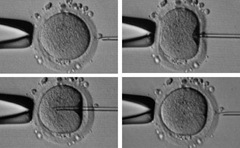
If surgery is unsuccessful, you may consider reoperation or in vitro fertilization (IVF) with intracytoplasmic sperm injection (ICSI). In most cases, repeat vasectomy reversal offers the best chance of success. Assisted reproduction (IVF and ICSI) should not be considered as an alternative to vasectomy reversal, but rather, an option in the event of vasectomy reversal failure or when there is a female factor contributing to infertility. The cost of assisted reproduction (IVF and ICSI) is up to three times as high as vasectomy reversal surgery. For the female partner, it involves hormonal therapy. For the male, it involves “sperm harvesting” or extraction of sperm from the testicle by needle aspiration. With IVF, mature human eggs and sperm are incubated in a culture dish. ICSI involves injecting a single sperm into an egg. This procedure greatly enhances the success of IVF. Once the fertilized egg is develops into an embryo, it is implanted into the uterus.
If you are interested in learning more about vasectomy reversal microsurgery, call Dr. Larish , the most experienced micro-surgeon for vasectomy reversal in NYC.

